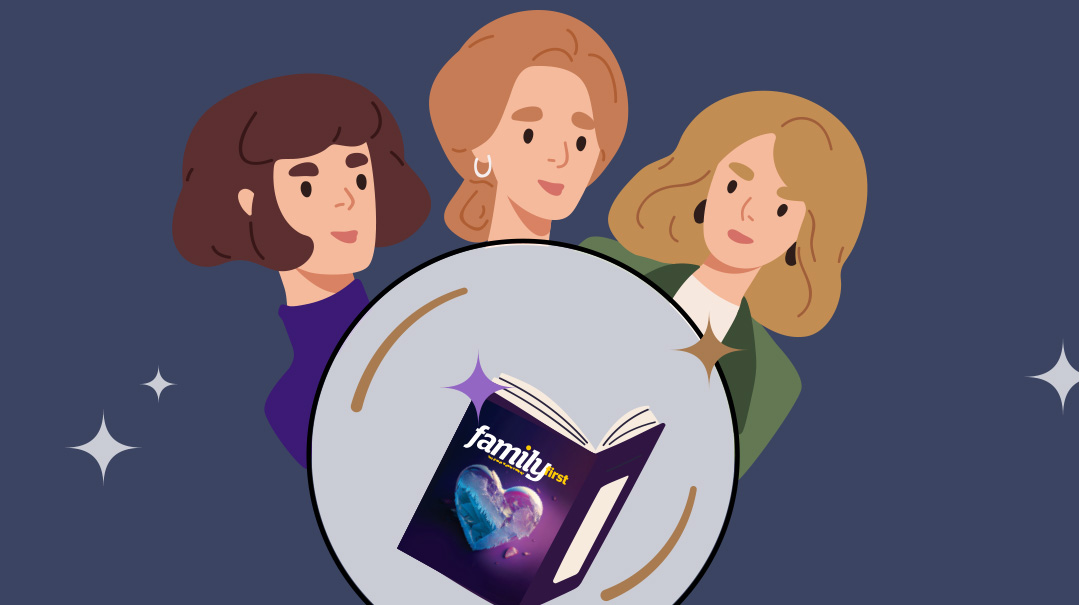The Contrarian Cabal

As an avid serial devotee, Gentle Reader, you surely spot the menace in that upbeat sign-off. You do, right?

IN
the heady days that followed the coup, anything seemed possible.
The bloodless regime change had placed T.F., of Lakewood, New Jersey, in the role of Chief Dictator for Life of the Greater Tristate Area. Her cronies, Anonymous from Monsey and Harried but Hospitable in Hackensack, ascended to the seats of power; they were known to kindergarteners everywhere as “second to the king,” but to actual students of political science as Vice Dictators.
It was only after the last crumbs of the celebratory doughnuts had been dispatched that the freshly minted heads of state sat down with their cabinet to ponder their newfound powers.
Dr. Leah Kirzner, lead data analyst (see On Your Mark, Issue 472 to learn more about how she balances a career in the exact sciences with Yiddishe mamahood and community service), presented first.
“As veteran letter-writers, having emphatic opinions in print qualifies us to solve the world’s problems, which is why we seized control in the first place. So we’ve begun by identifying some exciting trends among our citizens,” she said. “Specifically, there are many opinions that are so widely held as to be universal. If we enact laws that coincide with popular sentiment, we’re much less likely to be overthrown and beheaded.”
Shaindy Goldspiegel, Communications Director (a job that mostly entailed stirring up controversy by commissioning plausible-sounding letters to the editor), was tapped to head the committee for drawing up proposed legislation. She dove into her task with the fervor of an oldest girl who has been tasked with whipping her younger siblings into shape. She sifted through several years’ worth of magazine Inbox letters, charted trends, and crunched numbers, sustaining a particularly nasty cut from a jagged shard of a three.
Over a platter of pickled red onion-chipotle nachos, the Perfect Party Snack for the Pickiest Palate, which Came Together in Only Minutes (107 of them, to be exact), the team shared their results.
The others looked on with rapt interest as Shaindy strode to the head of the table and projected her slide deck.
“We’ll start with three truths that are basically axiomatic. We have a pretty unanimous voice telling us the following:
- Pictures on shidduch résumés are bad.
- Fat shaming is very bad.
- Teachers should earn more than cleaning ladies.
“According to our research,” Shaindy explained, “people who disagree with any of the above statements are inherently anti-social creatures who would also drown kittens, scowl at chubby babies, and roll their eyes at rhyming shalach manos poems. And since the only letters we’ve ever gotten that disagree with these statements came, according to our analysis, from bored older bochurim in the Irv, I think these are pretty safe ideas to kick off with.”
“Thank you, Shaindy, I’ll take it from here,” continued T.F. briskly. “We’re going to officially start the process for enacting communal takanos to address these issues. We’ll have a comment period, of course, though I don’t expect it to be anything but a formality. To be on the safe side, it’ll be the week before Pesach, when you can pretty much add a bionic teleporting nuclear supervillain to the middle of a 17th-century serial, and no one will notice, much less write in. With the comment period safely out of the way, we’ll be able to codify these principles into How Things Are Done. Looking forward, ladies! This is going to be great.”
As an avid serial devotee, Gentle Reader, you surely spot the menace in that upbeat sign-off. You do, right? I’m glad you’ve been paying attention.
Varda shook her head. “I’m sure of it this time. We’ve received so many negative comments, we’re going to have to disqualify this proposition.”
Feigy looked scandalized. “This makes no sense. Which of these suggestions could anyone disagree with?”
Shaindy scratched her head, a surefire sign that she was only a figment of some writer’s imagination rather than an actual human being doing actual human being things. She was promptly excised from the story.
“I don’t get it either,” said Leah, not taking any chances with an accompanying gesture. “Do you know anyone in real life who would argue with this stuff?”
“That’s just it,” said T.F. “None of us do. Or at least, not someone who would admit it publicly. But clearly, some people disagree, or we wouldn’t have to condemn all these problems all the time. It’s almost as if… as if there’s a secret cabal of people who quietly harbor bad opinions. We need to somehow get to the root of this.”
Her gaze wandered around the room, finally settling on a small but garish postcard peeking out from beneath some mail on her desk.
Pulling it out, she read off the title: “Contrarians of the World, Unite!” Underneath, in smaller letters, the text continued: Do you frequently find yourself stifled by your suffocatingly well-meaning neighbors? Are you the only one of your peers who will admit that making the right choices often yields unpleasant consequences? This is the conference you’ve been waiting for! Join hundreds of like-minded peers at the inaugural Me First convention, where your right to do as you please is celebrated.
“Varda,” said T.F., looking up, “pull together a disguise. You’re going undercover.”
Varda finagled an invitation to the exclusive conference by pretending — rather cleverly, she thought — to be the mother of the most eligible bachelor in BMG. Milling around the hotel lobby, she was startled to see several hundred other women whose name tags all read Mother, Best Boy in Lakewood (self-reported). All the representatives of that widely claimed persona greatly enjoyed Thursday afternoon’s breakout session, “Gelt without Guilt — Understanding Why the Richest Girl Is Absolutely Your Son’s Bashert,” which, back home, would not have been a socially acceptable claim.
It was only during the dinner break that Varda really got a chance to look around at her fellow attendees. This was a crowd that apparently did not even pay lip service to the popular idea that “It’s what’s inside that counts.” There were enough furs to dress an entire tribe of Eskimos and enough bling that the dark sunglasses in Varda’s disguise actually served a functional purpose.
At exactly 8:30, Varda donned the plastic glasses with attached nose, and slipped quietly into the hall where the evening’s support group was to be held. Spotting a chair sufficiently far back as to be unobtrusive, she soundlessly claimed it for her own, hiking it a few feet away from its neighbors for good measure. She pulled out her notebook, uncapped her pen, and listened intently as a pale, completely forgettable woman stood up and took the mic.
“Hi, everyone! My name is Aliza, and I have an unpopular opinion.”
“Hi, Aliza,” chorused the audience.
“My unpopular opinion is that materialism is awesome! The ultimate fulfillment of pas b’melach is small-batch sourdough and artesian well water. I think our high schools should offer classes in makeup application and fashion design because, well, let’s face it, looks are much more important in shidduchim than Ramban skills.”
There was applause, even as several people looked around cautiously to gauge the sentiment of their peers; it was, after all, an Unpopular Opinion.
But once Aliza broke the ice, other people seemed more willing to share.
Baila stood up and shared that, yes, there are a few things more important than shalom. Like making sure that good-for-nothing brother-in-law didn’t profit from his sneaky way of endearing himself to Bubby.
Chana felt the schools were not, in fact, serving enough candy, soda, and Red #4, considering how hard they expected boys to work every day. Besides, her kids were allergic to fruit.
Avrum, one of the few men present, spoke from behind a mechitzah. He worked hard for his money, and as a paying customer did not choose to waste his hard-earned cash on a profligate kollel couple who would buy pizza once every few months, so yes, he was absolutely entitled to see the kids’ credit card statements.
Varda, with her dark sunglasses and racing pen, did not arouse even the slightest suspicion from the group.
AT her keynote address Friday morning, titled “Your Secret Superpower,” Chedva Cheftzibah Kleinstein, Noted Speaker and Educator who freely admitted that she chose her line of work for the money and prestige, outlined her credo.
“… and this is why we had to come together to stand up for what we believe in. They can say what they want, this do-gooder administration trying to legislate our communal values,” she said forcefully. “But ultimately the power is in our hands. I don’t know a single girl’s mother who agrees with the shidduch picture thing. But as long as you demand it — She. Will. Book. The. Photographer.” A smattering of applause swelled from the audience.
“Be strong, Yiddishe Mama,” Mrs. Kleinstein concluded. “Doing the right thing always sounds so appealing, and you’ll get instant positive feedback from the small-minded goody-goodies with their simple black-and-white valuations. But don’t let the high-minded choice usurp the expedient. Remember: Society can take care of itself. Look out for number one!”
The audience buzzed with excited chatter as women gathered their bags and coats.
Varda slipped back on her plastic glasses with the fake nose and mingled with the crowd, who totally didn’t notice her.
When the knot of well-wishers around the speaker began to thin out, Varda seized her chance.
“Hi, I’m Talia Tirtza Teichenberg,” she said, approaching Mrs. Kleinstein. “That was a powerful talk. I especially liked the part where you said that as privately run entities, schools don’t owe anyone spots and are within their rights to auction off acceptances to the highest bidder. I write for Sichah Beteilah magazine, and I think some of your ideas would really resonate with our readers. Do you have a few minutes to share some thoughts?”
Mrs. Kleinstein simpered and rubbed her hands together, an unrealistic gesture if there ever was one. (It would have caused her to be immediately stricken from the story, but we need her for another few minutes.) She steered Varda by the elbow to a small table in an alcove conveniently located off the main hall. Even more conveniently, coffee and cups had mysteriously appeared, placed by some off-page support person in the nick of time.
Varda surreptitiously clicked her recorder on. “So, Mrs. Kleinstein, it takes a person of real courage and vision to advance opinions that aren’t always PC. Our readers would love to know: How did you get your start?”
“Well, ever since I was a kid, I’ve always enjoyed stealing candy from babies,” mused Mrs. Kleinstein, taking a sip of her coffee. “From there, it was just a hop, skip, and a jump to telling overweight people the truth they didn’t want to hear. But people were uncomfortable when I spoke the unvarnished truth. And then I realized that the do-gooders of the world were trying to cancel us.”
Varda looked quizzical.
“Look, Mammeleh,” said Mrs. Kleinstein, leaning forward. “They make everything sound so simple. ‘Don’t look at what the Cohens do, just make the bar mitzvah that you want and can afford.’ As if little Yanky won’t be in therapy for most of his adolescence if you decide not to pay for the eight-piece band and hot pastrami carving stations the rest of his class had. And instead of just acknowledging that basic truth of human nature, everyone pretends they’re bigger than that, that there’s something wrong with just being real about it.
“And furthermore.” Her thick, bejeweled finger stabbed out the syllables in the air. “Many people agree with my opinions, or think that they personally are exceptions, even if they won’t admit it to themselves. It’s not socially correct to admit that your daughter is a cut above all the other seminary applicants, but c’mon, what type of mother thinks the clods from next door produced a superior human being?” Mrs. Kleinstein warmed to her topic with all the delicacy of a freight train gathering steam.
“Take Proposition 32 that the new government is trying to pass, yes? ‘All struggling teens have beautiful neshamos and should be treated with warmth and compassion. No growing soul should be turned away from our heilige mosdos hachinuch.’ Who could argue with that, amiright?
“But then there’s Zack. He chain-smokes substances that I can’t mention in your magazine for fear of exposing teen readers, and he has more electronics in his pockets than are onboard a Tesla. But he does have a — what was that? A beautiful neshamah. A growing one. You’re okay if I seat him next to your Chezky in class, hmmm?” Chedva Cheftzibah Kleinstein purred. “Beautiful neshamah. Really growing. He told me he hopes to be clean by summer. Next summer, I mean. No doubt about it — some of these ideas are much more attractive in theory than in practice.”
“Is it hard, sometimes, to feel like a lone voice?” asked Varda. “Like everyone else has the ‘right’ opinions and you’re somehow… less than?”
“It’s true that not so many people agree with me out loud,” said Mrs. Kleinstein. “But the key to winning this fight isn’t to get people to verbally walk back their principles. We just need them to continue going with the flow. Even if they grumble about it. Because, you’ll notice, the flow is different from the high-minded virtue-signaling that fills the Inbox. They can continue writing all the tsk-tsking letters they want, as long as they keep knuckling under and doing what their neighbors are doing.”
Late Motzaei Shabbos, Varda hunched over the wireless radio transmitter in her room, urgently tap–tapping her findings in Morse code. Suddenly, the door to her room was flung wide open.
“Look! There she is!” exclaimed Mrs. Kleinstein. “See! I told you those glasses and nose were fake.”
“I bet her name isn’t even Talia Tirtza,” cried a woman in a messy pony sheitel.
Varda began to surreptitiously gather her papers. “How did you know?” she asked.
“It was that conversation at Melaveh Malkah,” said a woman with severe bangs. “I said that therapy is a 21st-century invention to make losers feel better about themselves, but you said… you said, ‘Therapy is a gift of self-discovery that every woman deserves. There should be no stigma attached to becoming a stronger, more empathetic person.’”
“You’re not one of us! You’re one of the Virtuous Everyone!” yelled Messy Pony.
Varda chose that moment to beat a hasty retreat, dramatically flinging open the window sash, and leaping from the (fortunately first-floor) window of her hotel room.
Racing to her getaway vehicle with her precious notebook and recorder hidden deep in her trench coat pocket, Varda felt like a real genuine actress in a real genuine made-for-frum-audiences thriller, until she remembered that only the boys get to use the guns and helicopters; the girls get song-and-dance ensembles cribbed from Broadway musicals.
She leaped behind the wheel of her 2017 Toyota Sienna and gunned the engine. Predictably, nothing happened, and the Bad Opinions were quickly closing in on her. It was too late. Because just like in real life, the good guys don’t always win.
(Originally featured in Family First, Issue 833)
Oops! We could not locate your form.







